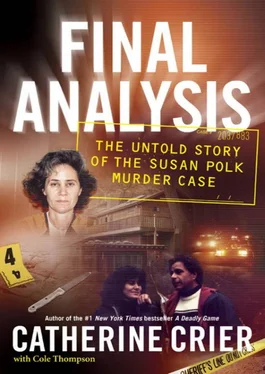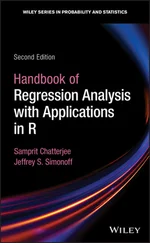On Tuesday, before the jury was brought into court, Susan asked that she be allowed to have attorney Gary Wesley of Mountain View present during her cross-examination by Sequeira. Susan told Brady that if she agreed to allow him to act as assistant counsel, he would be in court solely to make objections on her behalf. Sequeira immediately objected, arguing that the attorney was unfamiliar with the case and had not been in court during the thirteen weeks of trial. Allowing the lawyer to join at this late date would be “setting up a disaster” and could lay the groundwork for an appeal on the basis of “ineffective assistance of counsel,” he said.
“I’m extremely concerned about his competence. He can’t possibly know the ins and outs of this case,” Sequeira went on, insisting that Susan Polk “knows the case as well as anybody.”
Brady raised an eyebrow when Wesley stepped before her and admitted that since graduating from Santa Clara University Law School in 1978, he had never tried a murder case. Nevertheless, he had tried all felony cases “short of murder,” and ultimately, Brady allowed Wesley to act as assistant defense counsel during Susan’s cross-examination. This was not, however, a blank check; there would be ground rules. He could not offer any unsolicited advice. The judge also warned Susan that she would not be permitted to raise objections if she agreed to Wesley’s participation.
Brady fought back a smile when Susan agreed. “I’m going to hold you to that,” the judge grinned.
Wesley told reporters outside court that afternoon that he came on board at the request of Susan’s case manager, Valerie Harris, and had been providing informal counsel to Susan for several weeks. As if to demonstrate his familiarity with the case, he offered a criticism of Sequeira’s cross-examination of Eli Polk, calling it improper and accusing the prosecutor of crafting questions to “bait” the young man on the stand.
Susan ended her fourth day of direct testimony that Tuesday with what could only be described as a presentation of her kitchen knives. In a testimony akin to a sales presentation on the Home Shopping Network, Susan detailed each piece of cutlery, as a lanky deputy displayed them in his gloved hands. Though she was expressly forbidden to handle the utensils, she appeared happy to provide details about them to members of the jury. Jurors craned their necks to glimpse the family’s bread knife, a butcher knife, and a set of steak knives.
“That knife was everyone’s favorite knife,” Susan said of one steak knife, smiling as she explained how all three of her sons liked that one best. “It was always disappearing…. And that [a different knife] was the knife he [Felix] had in the cottage that he attacked me with,” Susan said of the one with the black handle. “Afterwards, I picked it up, brought it back into the kitchen, washed it, dried it, and put it away.”
Once Susan had finished with the detailed history of the Polk family cutlery, she moved on to an entirely new and until now, unmentioned subject. Susan attempted to raise allegations that her husband had engaged in inappropriate contact with his daughter from his first marriage. She provided no evidence and there is no evidence whatsoever to support these allegations. Nevertheless, it was Susan’s intention to introduce these allegations only by her own testimony. For much of her first four days on the stand, Sequeira had allowed Susan’s testimony to go into the record with few objections, but the period of relative calm in the courtroom came to an end with this latest development.
“I move for a mistrial based on being called a liar!” she demanded during a sidebar with the judge.
Susan flew into a rage after Sequeira objected to this line of testimony. Susan claimed that Jennifer had alluded to the abuse in letters she sent her father. But she could not produce the writings because someone had supposedly stolen her “Jennifer files.”
“I was impressed that we have gone for four days very smoothly,” Judge Brady said. “But this display in front of the jury with such a sensitive matter, especially when I’m learning for the first time that those letters just don’t exist anymore.”
“That’s not true!” Susan interrupted.
“Stop interrupting me,” Brady instructed. “I’m not done.”
“It is an outrageous abuse of your power to keep me silent on his abuse!” Susan shouted at Brady.
“Nobody’s going to keep you silent,” Sequeira mumbled aloud.
Unable to quell Susan’s rants, Brady adjourned for the day.
Before being led away that afternoon, Susan learned that Eli’s trial had resulted in a conviction on three of the six counts he was facing in connection with the March 2006 fight with his girlfriend. Valerie Harris was the one to deliver the news that a judge had just sentenced Eli to nine months in jail on the charges.
The next day, Susan’s cross-examination by the prosecutor began. That Thursday, Susan quickly charged Sequeira with using “doctored” photos of the crime scene and Contra Costa detectives with “staging” the scene to look like murder. She contended that pictures of her husband’s “defense wounds” appeared to have been magnified to make them appear more dramatic than they really were.
“They [detectives] were primarily focused on ensuring it did not look like self-defense,” Susan insisted when shown photos of the white numbered place markers encircling Felix’s bloodied body to indicate shoeprints found by police.
“Well, it looks as if someone, maybe a female deputy, because they’re really small shoes that fit in your shoe size range, maybe walked around the body and then walked to the bathroom,” Sequeira said in a raised voice. “Is that how it happened?”
“I think you guys goofed,” Susan implied. “I mean, to put two shoe prints, right-side shoes, side-by-side, like, what, I jumped up and did a whirligig?”
Later on, Sequeira stood before an easel, listing the names of all of the people that Susan had accused of lying about an aspect of her case. There was Gabriel, along with several members of the police department under the column labeled “Liars.” During the questioning, Susan pointed out that Felix had also lied and insisted the prosecutor renumber to put Felix’s name at the top of the list. Sequeira obliged, and changed the order to read: “1. Victim, 2. Gabe, 3. Sgt. Hanson.” Appearing at once ridiculous and true to Susan’s form, the display succeeded in demonstrating her confused paranoia. In Susan’s eyes, it was everyone against her—not because she was wrong but because she was persecuted. With this single gesture, Sequeira managed to show the entire court the skewed lens through which Susan viewed the world, while giving the members of the jury a concise look at the “enemies” that Susan claimed to have in the case.
As the cross-examination continued, Susan responded to questions about her motive for destroying potential evidence in the case. Sequeira asked why she laundered and repaired her blue jeans, got rid of the pepper spray, and washed the knife that Felix allegedly wielded that night, stripping it of potential fingerprints to prove her claim he had provoked the attack.
“Did you use that knife the next night?” Sequeira asked Susan. “Did you warn Gabe, ‘Hey, don’t use that knife?’”
“I don’t recall.”
“Is it possible that Gabe used the knife to eat his dinner? The same knife that was used to kill his father?”
Susan recoiled at the implication, claiming she had no idea if the knife was ever used again.
“In emergencies I get very fastidious. That’s just who I am. I cleaned it and put it away,” Polk said. “If you think that makes me a murderer? I mean, c’mon. But it makes a good story, so I guess you like that part.”
Читать дальше











